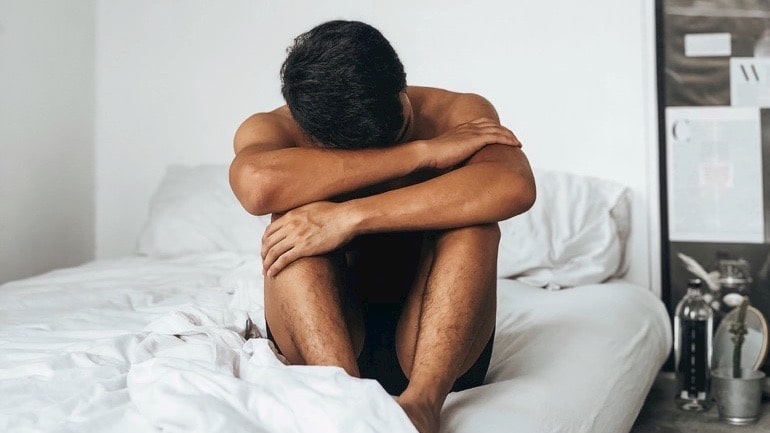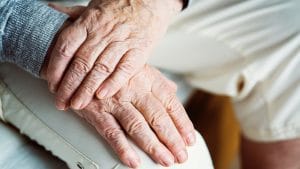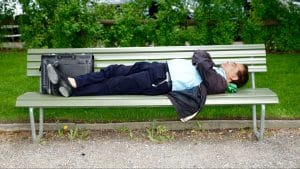Lack of Sleep and Pain: How to Break This Vicious Cycle
written by / April 9, 2020

As the population ages, the number of people suffering from diseases that cause back pain is steadily increasing. As a result, the relationship between sleep and pain has become one of the most critical aspects of this problem. Today, many people suffer from spinal diseases, more specifically, osteochondrosis. Since a person spends one-third of his or her life in bed, and quality of sleep largely determines how we feel throughout the day, we need to know what position we should sleep in if we’re experiencing chronic pain.
Why Does My Body Ache When I Go to Sleep?
There are different types of back and neck pain—usually associated with osteochondrosis, a degenerative disease in the bones and cartilage that isn’t inflammatory. And although the pathological process can affect virtually all joints, it’s most likely that the discs between vertebrae suffer from this disease. The association between pain and insomnia is a common problem among those who suffer from it.
In the past, only the elderly have experienced pain in the neck and other parts of the spine, but now the signs of osteochondrosis are increasingly found among younger age groups. This is because we’re spending a lot of time in front of the computer and in a chair as part of an increasingly inactive lifestyle.
Alongside these painful sensations and threats to our overall quality of life, our sleep worsens as a result, and getting a full night’s rest becomes almost impossible. This is where the question of how to sleep with back pain arises.
Notwithstanding the causes of the pain—genetic predisposition, spinal injuries, flat feet, being overweight, bad habits, and even prolonged stress—there are some common symptoms, like pain in the spine, muscle cramps, limb numbness, and migraine. In some cases, it may be possible to develop disorders in the spinal artery characterized by a burning sensation in the head, tinnitus, and dizziness.
When it comes to insomnia due to pain, experts believe that it isn’t just the intensity of these sensations that’s a problem. Patients respond more severely to inconsistent levels of pain, which varies from day to day, because it’s more difficult to mentally adapt. This emphasizes once again the great importance of sleep.
While this kind of pain goes away quickly, sleepless, physically excruciating nights are a daily routine for some people with chronic pain. Studies show that between 50% and 90% of people with chronic pain complain of insufficient sleep, in quality and/or quantity.
Can Lying in Bed Cause Body Aches?
According to the latest clinical studies published by the European League for Rheumatological Diseases (EULAR), sleep quality is directly connected to pain. Furthermore, insomnia has a significant influence on the development of chronic pain over time.
A study of sleep disorders and chronic pain focused on four critical points: difficulty falling asleep, trouble maintaining sleep, waking too early, and a lack of alertness after sleeping. Another important factor considered in the study was anxiety because it carries the additional risk of developing common chronic pain five years after its onset.
When analyzing the survey data on lack of sleep and joint pain, the researchers further considered the gender, age, socioeconomic status, and mental state of the participants and recalculated the results according to differences. These results show that disorders in the sleep cycle are an essential factor in the prognosis of chronic pain, especially in rheumatoid arthritis, and should not be underestimated in clinical settings.
Another study examined the association between musculoskeletal disorders and sleep problems in 254 adolescents from a Swedish school. They completed questionnaires associated with chronic pain, insomnia, stress, anxiety, and depression. One in ten participants reported chronic musculoskeletal pain during sleep with multiple outbreaks, and according to the analysis, the presence of chronic pain was associated with severe sleep disorders and anxiety.
In addition to severe painful distress, insomnia can lead to fatigue and depression. And this is only the beginning of the overall suffering that the body and mind go through as a result.
Can Lack of Sleep Cause Physical Pain?
One of the most common causes of insomnia is physical pain. And when we think about it, it really doesn’t take much. A pulled muscle from an overambitious workout or helping carry the neighbor’s furniture, and the next thing we remember is staring at the ceiling at three in the morning, tortured by intense back pain and longing desperately to fall asleep.
Because of this, we need to understand how to sleep with neck pain or other discomforts in the spine. There’s strong evidence that insomnia exacerbates the pain sensations that give rise to a vicious cycle: suffering won’t give you rest at night, and lack of sleep causes more pain. The good news is that there’s still much you can do. With lifestyle changes and medications prescribed by your doctor, you can break this cycle and finally indulge in your favorite nighttime activity.
Chronic pain and sleep alterations are well documented. During healthy sleep, we go through several stages of sleep, which are repeated 3–5 times during the night. Chronic pain disrupts the sequence of stages and may contribute to the severity of certain circadian rhythm disorders. While sudden and intense pain will wake you up with a cry, milder pain can cause sleep disorders without you even realizing it. Broken, insufficient sleep will make you feel eternally tired and put you in a bad mood for no apparent reason.
Many chronic pain and sleep problems are related, but the most common chronic pain causes are as follows:
- Headache
- Back pain
- Lower jaw pain
- Arthritis
- Fibromyalgia (pain in the muscles, ligaments, and tendons)
- Neuropathy or pain of neurological origin
- Premenstrual and menstrual cramps
- Acute injuries, surgeries, and cancer
All these sources of pain can interfere with normal sleep, thus causing different disorders.
Sleep and Pain Management

Pain is closely related to lack of sleep, and lack of sleep is closely associated with more pain, thus forming a kind of vicious circle. According to research, half of the elderly experience chronic pain, and about 75% of them are sleeping with pain. However, this pain/sleep cycle can be broken.
Specialists strongly recommend that people with chronic pain and insomnia observe good sleep hygiene—a medical term that describes good habits before bedtime. These recommendations are not specific to people with chronic pain since they can be implemented by anyone with insomnia and other sleep problems.
Here are 17 of our best tips on how to sleep with lower back pain, ect., to improve your sleep and therefore reduce your pain (and vice versa). Of course, the benefits of following these tips go far beyond lowering pain by improving your health, happiness, and overall longevity.
1. Relieve Your Pain Before Going to Bed
If the level of your pain is out of the ordinary in the evening before going to bed, getting a good night’s sleep with back pain, as well as neck, shoulder, or knee pain, might be impossible. Since it ruthlessly prevents you from falling asleep, it’s crucial to relieve the pain long before you fall asleep.
2. The Darker, the Better
Try to turn off and cover all the light sources in the bedroom while you sleep. This includes switching off and covering all glowing electronics and using blinds. If dimming certain light sources isn’t possible, consider using an eye mask.
3. Keep It Cool in the Room
When we talk about sleep and chronic pain, having a bedroom that’s too warm or too cold at night may impair your sleep quality. According to research, to improve your sleep, you must maintain a temperature of 61°–68° F (16°–20° C).
4. Silence Is Gold
Today in the modern world, with all the noisy and buzzing appliances and electronics, planes flying over your home, car alarms, and so on, pure silence is rarer than the rarest metal on Earth. The key to avoiding sleep disorders associated with insomnia and pain is to try to sleep in the quietest place possible. If silence isn’t possible, consider having white noise in the background or sounds you love, like a waterfall, wave surf, or your favorite music. As we can see, there are cases of sleep disorders where technology can help alleviate the symptoms brought on by the combination of poor sleep and pain.
5. Don’t Use Your Bed or Bedroom as an Office
If you use your sleeping space for work, meeting friends, or anything other than sleep and intimate moments, you’re probably sabotaging the quality of your sleep. This is because your brain will be trained to think about work, planning, etc., in the places you do these activities. If you experience both chronic pain and sleep deprivation, it’s time to stop working right before bed.
6. Avoid the TV Before Bed
It’s harmful to fall asleep in front of the TV. The same rule applies to playing games or working on your computer. The visual, auditory, and mental stimulation of the TV and computer are the last thing your brain needs for a night of healthy sleep. It’s best to rest for at least an hour before going to bed. Furthermore, lying in front of the TV is not the best sleep position for neck pain.
Instead, try reading a book, allowing your brain to relax for an hour or longer before sleeping.
7. Follow Benjamin’s Tip
“Early to bed and early to rise makes a man healthy, wealthy, and wise,” said Benjamin Franklin. Humans are not nocturnal creatures by nature. Before artificial light was invented, our ancestors naturally went to bed when it got dark and rose with the sun. Try to adjust your habits to the sun as much as possible, and you’ll sleep better at night, getting all the best benefits of sleep—especially if you’re wondering how to sleep with lower back pain, sciatica, or other types of bone pain.
8. Create and Follow a Regular Pattern for Your Sleep and Wake Cycle
Many people know this vital sleep tip in theory, but they don’t practice it. If you try going to bed and waking up at the same time every day, the vicious cycle of pain and sleep will cease.
9. Go to the Bathroom Just Before Bed
Just before going to bed, go to the bathroom to reduce the likelihood of waking up in the middle of the night. Also, limit your intake of liquids within the hour before going to bed, and definitely avoid drinking so much that you need to wake up at night and walk to the toilet. This is especially valid when you’re worried about how to sleep with upper back pain, lower back pain, neck and shoulder pain, etc.
10. Say No to Caffeine Long Before Bedtime
Since caffeine stays in your body for many hours—which means it can keep you awake for a long time after its initial invigorating effect—try not to drink caffeine-containing products from the early afternoon onwards.
11. Do Not Consume Alcohol in the Evening
A glass of wine or a cocktail may seem like the best way to fall asleep, but even a small amount of alcohol can impair sleep quality. In the morning, you’ll wake up more tired than ever. What’s more, we shouldn’t forget the risk of alcoholism.
12. Melatonin Pills
If you’re here to learn how to sleep with upper back pain and other types of chronic pain, you know it’s essential to fall asleep and stay asleep through the night. Melatonin, a natural compound closely linked to sleeping well, also possesses many other beneficial properties and will likely be helpful in this case.
Unfortunately, because of our lifestyles today, the levels of melatonin in our bodies may be largely inadequate—this is the main reason for the enormous increase in sleep problems among adults today. But taking nutritional supplements or pills with a safe and natural source of melatonin can help.
13. Meditation for Pain and Sleep
This technique could also be implemented to achieve a good quality of sleep regardless of pain, although it could reduce pain levels as well.
14. Avoid Napping During the Day
Short sleep breaks throughout the day will reduce the amount of sleep you get at night. Furthermore, sleeping on the couch is never the best way to sleep with back pain.
15. Exercise Regularly and Maintain an Active Lifestyle
Regular exercise is the key to good overall health, including having a good night’s sleep and reducing pain. You can practice a moderately intense sport in the earlier hours of the day and avoid intense workouts, especially in the late afternoon and evening. If you wait until later in the day, you’ll boost your energy, making it difficult to fall asleep. If pain is a severe problem that prevents you from exercising, consider adding gentle walks or swimming to your daily routine.
16. Make Sure You Have a Comfortable Bed!
This could be beneficial for both sleep apnea and back pain. Your mattress is one of the most important investments you can make. If you don’t feel like your bed is your paradise, consider replacing your mattress as soon as possible.
17. Eat Light Later in the Evening
Have dinner early. If you’re hungry but also want to avoid the unpleasant combination of sleep deprivation and muscle pain, when it’s time to go to bed, avoid greasy and spicy foods. Furthermore, aim for small amounts of food containing L-tryptophan, a fat-soluble amino acid that predisposes you to sleep. Some of the best sources of L-tryptophan are turkey and chicken, nuts such as hazelnuts, and fish such as salmon, sardines, and cod.
Sleep Positions for Lower Back Pain and Other Pain-Related Discomforts

Harmful habits during sleep can cause pain and stiffness in the spine and should be avoided. The following covers important aspects to consider in order to achieve a healthy night’s sleep.
Sleep Posture
If you like sleeping on your stomach, the chances of waking up with excruciating neck and spinal pain are quite high. Sleeping in unusual positions—like on your belly—usually causes a severe neck twist, which pressures the nerves in the area. Back sleeping is preferable and is the best sleep position for back pain. However, if you insist on abdominal sleep, a low pillow should be placed under the breast area.
To avoid discomfort and back pain, it’s recommended that pregnant women follow more specific instructions on how to sleep.
Your Mattress
Don’t sleep on too soft a bed. Despite the apparent comfort, in these conditions, the spine distorts unnaturally, and many hours spent lying on it cause palpable pain in the spine and neck.
At the same time, you shouldn’t buy a very hard mattress. It doesn’t allow the body to sink into the material; the spine bends, and painful sensations occur not only in the joints but also throughout the body.
The best way to sleep with lower back pain is to equip the bed with an orthopedic mattress, the construction of which adapts to a sleeper’s body. The best type of mattress depends on a person’s weight, size, and other parameters. Sleeping on surfaces that don’t provide the appropriate support, like a hammock, should be avoided.
Your Pillow
Your pillow is one of the leading culprits when it comes to neck pain and sleep disorders. It should be neither too high nor too low. Specifically, it should help maintain a straight spinal line in order to prevent any distortion.
A small, medium-to-soft pillow for the head and neck should be used—and your shoulders shouldn’t be in contact with the pillow. The quality of the pad is also crucial for a sound sleep. It’s best to buy small orthopedic sleep pillows for neck pain.
Weak Muscles
Weak muscles can also contribute to the emergence of pain and cramps. People with chronic degenerative diseases such as disc herniation, arthritis, or spinal distortions suffer most from pain during sleep and when getting up in the morning because of their lack of activity and muscle training. In these cases, analgesics and anti-inflammatory drugs could help increase these patients’ activity levels and strengthen their back muscles.
Remedies for Insomnia and Pain
Drug treatment for insomnia due to chronic pain involves taking at least one of two groups of medicines: painkillers and sleeping pills. They can be taken alone or in combination. Lesser, short-term pain symptoms can be successfully coped with by the use of non-steroidal anti-inflammatory drugs and non-opioid analgesics such as acetylsalicylic acid, paracetamol, ibuprofen, indomethacin, etc.
Sometimes patients suffer from a combination of disorders, such as neck pain and sleep apnea. In these cases, or if you have severe or chronic pain, be sure to consult your doctor. Most importantly, make sure you consider the frightening statistics about sleep apnea. Based on your condition, a specialist may prescribe opioid analgesics or medications that can help in certain cases of chronic pain: antidepressants and anticonvulsants.
To cope with insomnia, specifically in the case of poor sleep and back pain, your doctor may prescribe medications from the group of benzodiazepines that have a sedative effect. In addition, drugs of the newer generation include so-called non-benzodiazepine hypnotics, whose effects approach and exceed that of benzodiazepines with fewer side effects.
Don’t give up good habits before bedtime even if you’re prescribed medication for sleep with neck pain or back pain—the combined approach is the most successful.
Although there are a large number of medications on the market, there’s a catch. Some medications that reduce pain or help you fall asleep will worsen your sleep quality and may lead to addiction. For example, opioid analgesics, such as morphine and codeine, interfere with the ordinary course of sleep and reduce the time your body spends in deep sleep at night. There’s evidence that benzodiazepines and non-steroidal anti-inflammatory drugs also interfere with sleep but to a lesser extent.
FAQs
Does sleep help with pain?
Sleep itself may just be the best painkiller, according to new research. The results showed that rest could relieve chronic pain, whereas sleep deprivation increases sensitivity to pain by altering the brain’s anesthetic response. However, these detailed mechanisms should be investigated further.
Can you sleep while in pain?
Usually, chronic pain not only makes it harder to fall asleep but can also interrupt sleep. In these cases, it’s best to visit a doctor, and consider taking any medications right before going to sleep. This will help you fall asleep, maintain your rest, and avoid insomnia.
Why does pain get worse at night?
There are several explanations for this phenomenon, called painsomnia. At night, one’s levels of the anti-inflammatory hormone cortisol will naturally decrease. Your perception of pain is also changed due to the predominance of the autonomic nervous system. Pain thresholds are known to lower at night, thus leading to an increased sensitivity to pain. Nevertheless, in the case of sleep and pain, staying in one position for several hours can also contribute to joint pain at night and stiffness in the morning.
Conclusion
The experts are unanimous: in no case should the sleep disorders caused by chronic pain be underestimated. In most cases, these problems will not resolve on their own, so be active and seek medical attention when necessary. Although the relationship between sleep and pain is complex, research shows that this connection is strong and needs to be investigated in greater detail.









Warning: Undefined array key "format" in /home/602518.cloudwaysapps.com/cspedpjass/public_html/wp-content/themes/disturbmenot/template-parts/post-item/post-comment.php on line 23
Warning: Undefined variable $commenter in /home/602518.cloudwaysapps.com/cspedpjass/public_html/wp-content/themes/disturbmenot/template-parts/post-item/post-comment.php on line 27
Warning: Trying to access array offset on value of type null in /home/602518.cloudwaysapps.com/cspedpjass/public_html/wp-content/themes/disturbmenot/template-parts/post-item/post-comment.php on line 27
Warning: Undefined variable $commenter in /home/602518.cloudwaysapps.com/cspedpjass/public_html/wp-content/themes/disturbmenot/template-parts/post-item/post-comment.php on line 29
Warning: Trying to access array offset on value of type null in /home/602518.cloudwaysapps.com/cspedpjass/public_html/wp-content/themes/disturbmenot/template-parts/post-item/post-comment.php on line 29